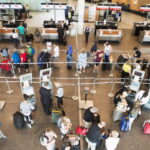Earlier this year, two Harvard medical historians published an article on a leading American medical journal’s willful ignorance of Nazi atrocities in the 1930s and ’40s. The article found that the New England Journal of Medicine, one of the nation’s longest-running and most prestigious medical publications, either chose not to cover the Nazi regime’s racist and antisemitic health policies, mass killings, and medical experimentation, or, in one case, praised the Nazi health care system for its approach to public health.
The New England Journal of Medicine convened a symposium on Wednesday where the authors, Joelle M. Abi-Rached and Allan M. Brandt, could present their findings — and Abi-Rached took the opportunity to call the journal out for repeating its mistakes today.
“Is the silence of the journal regarding the pulverization of the health care system in Gaza, and Israel’s relentless attack on health care workers and the creation of a public health and humanitarian disaster and the weaponization of starvation similar or different to its silence during the Holocaust?” Abi-Rached said toward the end of her talk, joining the symposium virtually from Paris. “What explains the erasure of the predicament of Palestinians in the pages of the journal? What do we mean by the political determinants of health if we precisely ignore the plight, the health, and well-being of marginalized and vulnerable populations?”
Abi-Rached, who recently fled the Israeli bombing campaign in Lebanon, where she grew up and had been teaching, questioned why the journal has yet to publish any articles about Palestinians and Gaza.
During her talk, Abi-Rached cautioned that the destruction in Gaza is a part of “a significant erosion” of the international humanitarian laws and framework born out of World War II and after the atrocities of Holocaust. She then noted that no one should be surprised that her paper with Brandt, published amid the war in Gaza, had “elicited such strong reactions among medical doctors, public health experts and other healthcare personnel, and the wider public, who were rightly appalled by the silence of the journal regarding the suffering of Palestinians.”
She said that it is the role of historians, medical journals, and universities to speak out and raise such questions to reckon with both past and present, referring to Israel’s war in Gaza as “the most glaring and moral crisis of our time.”
“What is happening today in Gaza is unprecedented. It far surpasses the violations of medical neutrality seen in El Salvador, Chile, Nicaragua, Guatemala, Syria, Sudan, or Ukraine,” Abi-Rached continued. “We are witnessing today the same deliberate and systematic targeting of health care personnel, not only in Gaza, but also in Lebanon where the conflict has moved and shifted.” (“Medical neutrality” refers to the principle of preserving access to medical care during times of war.)
Abi-Rached’s remarks arrive at a moment when many in the medical community are speaking out about atrocities carried out by the Israeli military, largely led by medical workers who have treated patients in Gaza’s hospitals over the past year.
Most recently, Feroze Sidhwa, a surgeon who worked at the European Hospital in Khan Younis, Gaza, for two weeks in March and April, wrote an op-ed for the New York Times based on the observations of 65 doctors, nurses, and paramedics who saw patients during the war. Doctors provided X-ray images showing bullets embedded in the skulls and spines of patients. Many reported that they repeatedly treated children, often under 12, shot in the head or chest. Pro-Israel critics dismissed the evidence as “digitally altered or completely falsified,” and The Times took the unusual step of publishing a note saying that the paper stood by the reporting after doing “additional work to review our previous findings.”
Throughout the war in Gaza, the Israeli military has targeted hospitals in repeated airstrikes and ground operations.
Earlier this week, 19-year-old Palestinian student Shaban al-Dalou was tragically burned alive while connected to an IV drip after an Israeli airstrike on Al-Aqsa Hospital ignited the tents of displaced people seeking shelter there.
Over 800 healthcare workers have lost their lives in Gaza in the past year, and many hospitals have been destroyed or are struggling to function due to a lack of resources amid the ongoing blockade on medical supplies. In Lebanon, half of the medical centers and clinics have closed due to damage from recent bombings.
Abi-Rached and Brandt’s article, “Nazism and the Journal,” sparked controversy for its failure to address Israel’s actions in Gaza and the ongoing crisis there. The New England Journal of Medicine’s editor-in-chief, Eric Rubin, acknowledged the journal’s silence on Gaza and expressed a desire to find a unique perspective to address the situation.
During a discussion, a participant argued for neutrality in medical services, citing Hamas’s rejection of Red Cross aid and allegations of using hospitals for military activities. Abi-Rached countered this argument, cautioning against justifying attacks on hospitals based on the presence of combatants, drawing parallels to historical fascist tactics.
Abi-Rached previously highlighted the impact of Israel’s wars on Lebanon’s healthcare system in a Boston Review article, recounting the influx of patients from Israeli bombings. She emphasized the urgent need to address the consequences of conflict on healthcare systems and the importance of upholding humanitarian norms. “Powerful democracies in the West are allowing the testing, studying, and perfecting of new weapons on expendable lives.”
Abi-Rached posed the question, “Is the ongoing war a part of the expansion of Eretz Israel, fueled by the far-right government of Benjamin Netanyahu?” He also questioned if the trauma of the Holocaust, passed down through generations, has led to a transfer of hate from Nazis to ‘Arabs’ who were not involved in the Holocaust.
Source link




